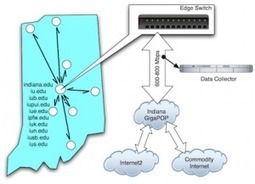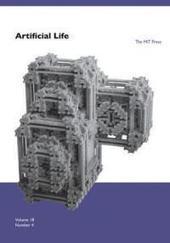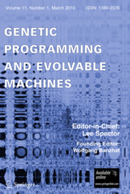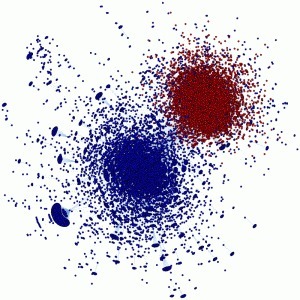 Your new post is loading...
 Your new post is loading...

|
Suggested by
Fil Menczer
January 21, 2013 2:08 PM
|
To foster the study of the structure and dynamics of Web traffic networks, we are making available to the research community a large Click Dataset of about 13 billion HTTP requests collected at Indiana University. During about seven months of collection in 2006-2007, our system generated data at a rate of about 60 million requests per day, or about 30 GB/day of raw data. We hope that this data will help develop a better understanding of user behavior online and create more realistic models of Web traffic. The potential applications of this data include improved designs for networks, sites, and server software; more accurate forecasting of traffic trends; classification of sites based on the patterns of activity they inspire; and improved ranking algorithms for search results.

|
Suggested by
Joseph Lizier
January 18, 2013 2:31 PM
|

|
Scooped by
Complexity Digest
January 10, 2013 1:43 PM
|
Full time tenure track researcher position available at the Physics Institute, Universidad Nacional Autónoma de México

|
Scooped by
Complexity Digest
December 26, 2012 9:57 PM
|
Instructor: Melanie Mitchell
Launch date: January 28, 2013
Prerequisites: None
Cost: Free
Credit offered: None, though everyone who successfully finishes the course will receive a certificate of completion from the Santa Fe Institute.
Course length: 11 weeks
Approximate workload: 3-6 hours per week

|
Scooped by
Complexity Digest
December 3, 2012 12:13 PM
|
Anthropologists need a better way to study the movements of the last few remaining uncontacted, indigenous human societies – a way that doesn’t involve directly observing, and therefore altering, their ways of life. Our project would test a new method of remote observation using satellite tracking technology and, perhaps, help conserve the landscapes on which these endangered groups depend. You can help us get our pilot project off the ground by contributing to our purchase of the small number of satellite devices we need to test this method with the Ache. Each NorthStar TrackPack costs approximately $300. We would like to purchase at least 10 of these devices, and as many as 20, to use with the Ache. Your donation will make testing this approach possible. If our campaign is highly successful and we raise the money for 20 devices, we would additionally purchase satellite imagery to help us better understand the landscapes through which these uncontacted groups are moving. http://rkthb.co/11794

|
Scooped by
Complexity Digest
November 30, 2012 10:28 AM
|
DDLab has been extended for Null Boundary Conditions (NBC), where inputs beyond the network's edges are held at a constant value of zero (though another value is possible). This contrasts with Periodic Boundary Conditions (PBC), up till now the only method adopted for cellular automata (CA) in DDLab. NBC are of interest in pattern recognition, and other applications where the system is grounded or quenched, or bounded by edge, skin or membrane. As for PBC, NBC are also interesting as mathematical/dynamical systems in their own right. http://www.ddlab.org/

|
Scooped by
Complexity Digest
November 27, 2012 10:56 AM
|
The University of Vermont (UVM) seeks a tenure track assistant professor with outstanding research and teaching capabilities in the realm of Computational Social Science. Candidates will be expected to have a Ph.D. in a computationally-focused program within the social and economic sciences, or in one of the computational, mathematical, and natural sciences. The successful candidate will join the Complex Systems Spire, one of UVM's three Transdisciplinary Research Initiatives (TRI) (http://www.uvm.edu/~tri), as well as UVM's Complex Systems Center (http://www.uvm.edu/~cmplxsys/). The candidate's tenure home---department and college---will be based on the individual's background and research interests, and will be determined during the appointment process. The position will be effective September 1, 2013.

|
Scooped by
Complexity Digest
November 23, 2012 1:34 PM
|
Journal on Self Computing (JSC), a quarterly peer-reviewed journal, aims to provide a prestigious forum for researchers and practitioners world-wide to exchange new results in design and development of computers, networks, and control systems with self-properties, where examples of self-properties include self-stabilizing, self-organizing, self-repairing, self-healing, self-adaptive, self-aware, self-coordinating, self-protecting, etc. Its scope includes: Autonomic and adaptive systems
Self-optimizing and self-protecting systems
Self-organizing computing and networking techniques
Impossibility results and lower bounds on self-computing
Self-properties and their relation with classical fault-tolerance and security
Self-techniques for sensor networks, ad-hoc networks, vehicular networks
Self-control and actuation systems
Cyber-physical systems with self-properties
Bio-inspired techniques on self-systems
Stochastic, physical, and biological models with self-properties

|
Scooped by
Complexity Digest
November 20, 2012 2:54 PM
|
Leaders in the public and private sectors are facing unprecedented challenges as they operate and make decisions in a context of increasing complexity. Hyper-connectivity calls into question many traditional problem-solving approaches – regarding diverse matters, from urban population growth to global capital flows – and it limits our capacity to manage these problems. At the same time, opportunities for solutions – via which to deliver greater benefits for stakeholders, cutting across traditional silos and offering more sustainability – are growing. The Global Agenda Council on Complex Systems examines how insights gleaned from complexity science and systems analysis can best be applied to improve the thoroughness and quality of decision-making and to deliver better results for larger numbers of beneficiaries worldwide.

|
Scooped by
Complexity Digest
November 13, 2012 4:09 PM
|
NECSI is looking for the following applicants: Postdoctoral and Student Researchers
Faculty Members
Science Writer
Postdoctoral and Student Fellows
Faculty Fellows

|
Scooped by
Complexity Digest
November 3, 2012 8:48 AM
|
The School of Informatics and Computing at Indiana University, Bloomington, invites applications for a junior faculty position in the area of complex networks and systems to begin in August 2013. This is one of seven faculty positions the School seeks to fill beginning in Fall 2013. There are separate postings for each area and each area requires a separate application: computer science education research (joint position with School of Education), computer science (all subareas; two positions), computer security, human-computer interaction and health informatics. The School expects continued hiring in the coming years.

|
Scooped by
Complexity Digest
October 28, 2012 11:37 PM
|
The Young Scientist Award (YSA) seeks to promote the work of young researches and honors exceptional original contributions that use methods from physics to gain a better understanding of socio-economic problems. The prize is currently endowed with 5000 Euro. The YSA is intended for young scientists not older than 40 years. The submission for nominations is open until December 1, 2012

|
Scooped by
Complexity Digest
October 23, 2012 11:37 AM
|
The Sveriges Riksbank Prize in Economic Sciences in Memory of Alfred Nobel 2012 was awarded jointly to Alvin E. Roth and Lloyd S. Shapley "for the theory of stable allocations and the practice of market design"
|

|
Suggested by
Hiroki Sayama
January 21, 2013 2:08 PM
|
We are pleased to announce the launch of our new website. This is the first stage of our planned development of the site, and more improvements will be rolled out over 2013.

|
Scooped by
Complexity Digest
January 14, 2013 3:18 PM
|

|
Scooped by
Complexity Digest
December 28, 2012 12:18 PM
|
GPEM is calling for papers for a special issue on Evolvability and Robustness in Artificial Evolving Systems. A diversity of concepts under the rubrics of ‘evolvability’ and ‘robustness’ has been introduced as the literature on these subjects has expanded. This special issue is open to the full range of these concepts.. However, confusion has entered the literature due to imprecise usage of these terms. Therefore, a unique requirement for this special issue will be that the authors provide precise quantitative definitions for the aspects of ‘evolvability’ and ‘robustness’ they investigate.

|
Scooped by
Complexity Digest
December 4, 2012 9:45 AM
|
The Third Edition of the Encyclopedia of Systems and Cybernetics is a joint project by the IFSR - International Federation for Systems Research and ISCE - the Institute for the Study of Coherence and Emergence. Entries from the Second Edition are shown along with the opportunity for comments regarding those entries. All comments will be taken into account in the editorial process http://systemspedia.org

|
Suggested by
Fil Menczer
December 3, 2012 11:43 AM
|
The Center for Complex Networks and Systems Research (CNetS.indiana.edu) at Indiana University, Bloomington has an open postdoctoral position to study how ideas propagate through complex online social networks. The position is funded by a McDonnell Foundation's grant in Complex Systems (www.jsmf.org/grants/2011022/). The appointment starts as early as possible after January 2013 for one year and is renewable for up to 2 additional years. The salary is competitive and benefits are generous. The postdoc will join a dynamic and interdisciplinary team that includes computer, physical, and cognitive scientists. The postdoc will work with PIs Filippo Menczer and Alessandro Flammini, other postdocs, and several PhD students on analysis and modeling of social media data. Areas of focus will include information diffusion patterns, epidemic models for the spread of ideas, interactions between network traffic and structure dynamics, and agent-based models to explain the emergence of viral bursts of attention. Domains of study will include politics, scientific knowledge, and world events. Go to the grant page or cnets.indiana.edu/groups/nan/truthy for further details on the team and project. The ideal candidate will have a PhD in computing or physical sciences; a strong background in analysis and modeling of complex systems and networks; and solid programming skills necessary to handle big data and develop large scale simulations. To apply, send a CV and names and emails of three references by email to <tgholbro@indiana.edu> or by mail to CNetS, 919 E 10th Street, Bloomington, IN 47408, USA. Applications received by 15 December 2012 will receive full consideration, but applications will be considered until the position is filled. Indiana University is an Equal Opportunity/Affirmative Action employer. Applications from women and minorities are strongly encouraged. IU Bloomington is vitally interested in the needs of Dual Career couples.

|
Scooped by
Complexity Digest
November 27, 2012 4:28 PM
|
This peer reviewed open access journal is dedicated to the dissemination of high quality original and innovative research work on theories, methodologies, and applications of cybernetics and systems research. It publishes the proceedings of the European Meetings on Cybernetics and Systems Research (EMCSR) and peer reviewed papers on systems, complexity and network research, as well as insightful survey papers. The journal endorses cross-disciplinary approaches and welcomes contributions that elucidate commonalities and compatibilities in natural, artificial, and social systems. Among the topics covered are cybernetics, general systems theory, complex adaptive systems, theory of social systems, systems biology, economic systems, modeling, complexity, network theory, computational and information theory.

|
Scooped by
Complexity Digest
November 23, 2012 3:31 PM
|
For a long time researchers from all disciplines have avoided the use of universal mathematical measures of information theory (beyond the traditional computable, but limited, Shannon information entropy), measures such as Kolmogorov-Chaitin complexity, Solomonoff-Levin universal induction or Bennett's logical depth, as well as other related measures, citing the fact that they are uncomputable. These measures are, however, upper or lower semi-computable and are therefore approachable from below or above. For example, lossless compression algorithms can approximate Kolmogorov-Chaitin complexity (a compressed string is a sufficient test of non-randomness) and applications have proven to be successful in many areas. Nevertheless, compression algorithms fail to compress short strings and do not represent an option for approximating their Kolmogorov complexity. This online calculator provides a means for approximating the complexity of binary short strings for which no other method has existed until now by taking advantage of the formal connections among these measures and putting together several concepts and results from theoretical computer science.

|
Scooped by
Complexity Digest
November 20, 2012 4:04 PM
|
The Latin American Node of FuturICT (http://futurict.unam.mx ) is launching a call to identify potential collaborators in Latin America with research groups within the FuturICT FET Flagship project (http://futurict.eu ).
FuturICT is a major project which aims at tackling the global challenges of humanity in the 21st century. Its goals, structure, and proposed methods can be found at http://www.futurict.eu/the-project/proposal
Latin American researchers, companies, organizations, and governments interested in participating in FuturICT are invited to submit a two page proposal describing their interests, expertise, and contact details. The proposal should specify in which aspect of FuturICT the collaboration is proposed. At the Latin American Node, we will integrate the proposals and facilitate the contact with particular groups in Europe and elsewhere.
Please submit your proposal before January 7th, 2013 to futurict@futurict.unam.mx

|
Scooped by
Complexity Digest
November 20, 2012 2:43 PM
|
We are seeking to recruit a Senior Research Fellow in Complexity Economics (up to 3 posts) to join the research team based at INET@Oxford at the University of Oxford.The advertised post is funded through the Institute of New Economic Thinking at the Oxford Martin School. The Complexity Economics Programme is based at the Saïd Business School and at the Mathematical Institute.

|
Scooped by
Complexity Digest
November 5, 2012 6:40 PM
|
Santa Fe Institute will be launching a series of MOOCs (Massive Open On-line Courses), covering the field of complex systems science. Our first course, Introduction to Complexity, will be an accessible introduction to the field, with no pre-requisites. You don't need a science or math background to take this introductory course; it simply requires an interest in the field and the willingness to participate in a hands-on approach to the subject.
In this ten-week course, you'll learn about the tools used by complex systems scientists to understand, and sometimes to control, complex systems. The topics you'll learn about include dynamics, chaos, fractals, information theory, computation theory, evolution and adaptation, agent-based modeling, and networks. You’ll also get a sense of how these topics fit together to help explain how complexity arises and evolves in nature, society, and technology.
Introduction to Complexity will be free and open to anyone. The instructor is Melanie Mitchell, External Professor at SFI, Professor of Computer Science at Portland State University, and author of the award-winning book, Complexity: A Guided Tour. The course will begin in early 2013.

|
Suggested by
Joseph Lizier
October 30, 2012 12:52 PM
|
Frontiers in Neuroinformatics Research Topic: Information-based methods for neuroimaging: analyzing structure, function and dynamics The aim of this Research Topic is to discuss the state of the art on the use of Information-based methods in the analysis of neuroimaging data.
Information-based methods, typically built as extensions of the Shannon Entropy, are at the basis of model-free approaches which, being based on probability distributions rather than on specific expectations, can account for all possible non-linearities present in the data in a model-independent fashion.
Thus, for instance, to compute the statistical dependence between two random variables, the Mutual Information accounts for the information bits that the two variables are sharing (if it is zero, the two variables are statistically independent).
Mutual Information-like methods can also be applied on interacting dynamical variables described by time-series, thus addressing the uncertainty reduction (or information) in one variable by conditioning on another set of variables. This is the spirit of the growing-in-popularity Transfer Entropy (Schreiber 2000), an Information-based method to estimate directed influence. Hosted By: Daniele Marinazzo, University of Gent, Belgium
Jesus M. Cortes, Ikerbasque. Biocruces Health Research Institute, Spain
Miguel Angel Muñoz, UNIVERSIDAD DE GRANADA, Spain Deadline for abstract submission: 01 Jan 2013 Deadline for full article submission: 01 Jun 2013 http://www.frontiersin.org/Neuroinformatics/researchtopics/Information-based_methods_for_/1241

|
Scooped by
Complexity Digest
October 27, 2012 10:02 PM
|
FuturICT (www.futurict.eu ), scientifically lead by Professor Dirk Helbing (ETHZ) and coordinated by Professor Steven Bishop (UCL) has now submitted an outstanding proposal to the EC on behalf of a consortium of leading EU universities and research organisations. FuturICT was rated 1st out of the 21 proposals received for the initial stage of the competition which asks for visionary and highly ambitious proposals around Big Science projects that extend over a 10 year period and €1 Billion budget. The report on the FuturICT Pilot Phase was rated “excellent” by the external reviewers.
|





 Your new post is loading...
Your new post is loading...




















